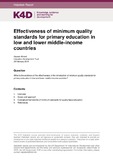| dc.contributor.author | Ahmed, Hassan | |
| dc.coverage.spatial | Vietnam | en |
| dc.coverage.spatial | Indonesia | en |
| dc.coverage.spatial | Central Asia | en |
| dc.coverage.spatial | Nigeria | en |
| dc.coverage.spatial | Pakistan | en |
| dc.coverage.spatial | Uganda | en |
| dc.date.accessioned | 2019-03-18T10:30:15Z | |
| dc.date.available | 2019-03-18T10:30:15Z | |
| dc.date.issued | 2019-02-28 | |
| dc.identifier.citation | Ahmed, H. (2019). Effectiveness of minimum standards of quality basic education in low and lower middle-income countries. K4D Helpdesk Report. Brighton, UK: Institute of Development Studies | en |
| dc.identifier.uri | https://opendocs.ids.ac.uk/opendocs/handle/20.500.12413/14413 | |
| dc.description.abstract | Minimum quality standards for education are common in low and lower middle-income countries. However, the scope and use of these standards are determined by the country’s level of development. Therefore, some countries have advanced standards, whilst others have simple tools and frameworks to guide the quality of their basic education. Minimum standards are used to monitor, evaluate and inspect the quality of education provision. As such they can also improve accountability in education. However, the availability of minimum quality education frameworks and tools in a country does not always mean they are effective as the availability of both technical and financial resources affects implementation. Overall, minimum standards of basic education contribute to different aspects of quality education. For example, compliance to school infrastructure and environment might promote the safety, health and general well-being of the learners but if the standards of the teacher quality and teaching learning resources are not met then good students’ learning outcomes may not be achieved. Generally, there is an agreement and assumption that the use of minimum standards supports the harmonisation of education provisions and can contribute to quality education. | en |
| dc.language.iso | en | en |
| dc.publisher | IDS | en |
| dc.relation.ispartofseries | K4D Helpdesk Report;548 | |
| dc.rights.uri | https://www.nationalarchives.gov.uk/doc/open-government-licence/version/3/ | en |
| dc.subject | Development Policy | en |
| dc.subject | Education | en |
| dc.title | Effectiveness of Minimum Quality Standards for Primary Education in Low and Lower Middle-Income Countries | en |
| dc.type | Helpdesk | en |
| dc.rights.holder | © DFID - Crown copyright 2019 | en |
| dcterms.dateAccepted | 2019-02-28 | |
| rioxxterms.funder | Department for International Development, UK Government | en |
| rioxxterms.identifier.project | K4D | en |
| rioxxterms.version | VoR | en |
| rioxxterms.funder.project | 238a9fa4-fe4a-4380-996b-995f33607ba0 | en |

